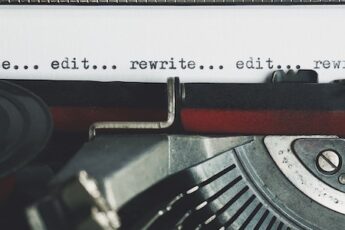
I’ve had my fair share of writer’s block. It can come in various forms and guises. Sometimes it’s related to a specific piece of work, and I can’t force the words onto the page. Other times it can be a total creative block, where every sentence feels harshly forced, and I lack inspiration for the next.
Most writers I’ve spoken to have many similar experiences and different ideas and approaches to come out the other side. I have a few go-to techniques and effective exercises I’ve learned over the years, but I’ve also learned to take a step back and acknowledge writer’s block.
Now when writer’s block comes, I take notice. I focus on the ‘why’ rather than the ‘how.’ Often, I find this creative frustration is telling me something important. Here are seven lessons I’ve learned from writer’s block:
There’s a problem with my workspace

I have a mild obsessive-compulsive disorder (I suspect most creative people do). It’s not overbearing and rarely noticeable, but I know I need a certain amount of structure and organisation to get the most access to my creative side. It’s a kind of yin and yang thing; without order, I can’t access my chaos.
When I’m sitting at my desk and hit a creative block, one of the first things I do is take a literal step back and assess the space around me. If my desk or the room is a mess, that usually plays a role in my creative frustration. If there’s any clutter or chaos in the room, I’ll immediately tidy up and organise the space, then take a 5 min break from the room and start again.
The story needs more time in my head
I do as much as 90% of the writing for a story in my head. When I first get an idea, I might start to write down a few notes or sit at my desk and try to piece together the moments, but it’s in my head where I obsess over an idea and play out the scenes over and over. More often than not, when I sit down to write, I’ve already written and rewritten a scene or blog several times in my head.
When I get writer’s block and struggle with a particular piece of writing, sometimes that’s a sign that the story needs more time in my head. One of the most effective ways of dealing with this is to go for a long walk or run and start to talk myself through a scene or two.
If the story isn’t coming together in my head and I feel the need to get something on the page, a good exercise is to try to tell it in the shortest way. First, I’ll try to tell the story in one sentence. Then expand that to three sentences. Then 1 paragraph. Then three paragraphs.
I’ve been too inactive

As I’ve slowly grown wiser as to how my mind works, I’ve begun to understand how important my physical health is to my mental health. In the past, when I’ve faced mental health challenges, I’ve often disregarded the role my physical health plays until recent years. While I wouldn’t consider writer’s block a mental health issue, the relationship with physicality is still there.
Some studies conclude that physical activity correlates to creativity, and I believe this. If I’m facing writer’s block and I’ve been inactive that day, it’s often related. If I hit a creative block and admit I’ve been too inactive that day, I’ll immediately go for a run, cycle, or brisk walk, which will often help get the creative juices flowing. I’ve now developed a habit of daily exercise first thing in the morning. Since making this lifestyle change, my creative output has increased.
I’ve been too active
With that said, it can also work both ways. There’s something about running and cycling or doing more monotonous exercise which gets my creative ideas flowing. I’ll often have some of my best ideas while out on a running or fast walk. I’ll sometimes be at the gym or running hard when I get excited about an idea, and I’m then eager to get writing, but once back at my desk, I quickly hit a creative wall.
Physical exhaustion can lead to mental fatigue. If you’re doing a lot of exercise and pushing your physical limits, you might not be leaving enough energy to write. If I’m facing a creative block after a lot of exercise or when I’m feeling tired, the simple solution is to rest. Any ideas can be quickly noted or dictated.
I’m under too much pressure

I’m super organised and take pride in keeping on top of my work and managing my time well, but sometimes you hit a wall. It’s hard to judge how long a scene or article will take to write; sometimes it flows, and sometimes you get deep in and realise you need to start again. When working to a deadline, and the work is taking longer than I expected, I often find writer’s block can go hand in hand with a looming deadline.
When I’m feeling the pressure of a deadline and getting writer’s block, the simple and often only solution is to remove the deadline. Usually, as soon as a deadline feels unrealistic, I’ll let the person know that I won’t be able to meet it. It’s not something I do very often, but when I do so, it can free my creativity, and I end up delivering on time.
I’m not under pressure
This one also goes both ways, and having a deadline, and a bit of pressure can be a good thing. If I’m writing something for a project or someone else, and they haven’t set a deadline and rarely ask for updates, that can be why I’m feeling writer’s block.
You can’t always write the things you are most excited about, and deadlines and benchmarks are vital if you’re working on a project you aren’t fully obsessed with. On projects like these, it’s essential to set your deadlines and limits and add enough pressure to get you writing. I’ll often find the deadline will at least force me to start writing, and as I write, the enthusiasm and inspiration will grow.
I’m feeling unworthy
Sometimes my creative block has far less to do with what, where, or why I’m writing; it becomes the somewhat deeper issue of imposter syndrome. Self-doubt can creep up on you and cause you to question your abilities. At its worst, you can feel like a total fraud who has somehow fooled everyone into thinking you are talented.
Imposter syndrome was something I struggled with a lot when I first started writing, and I still get it now. When it comes, I have a few techniques I work through, but usually, I try to laugh it off. The idea of not being worthy as a writer, or feeling like a fraud, is absurd. Anyone who writes is a writer, and the best cure is usually to write.




